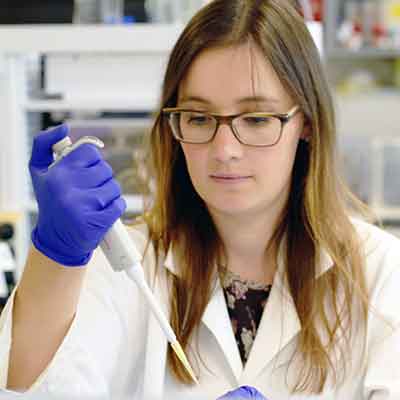|
Elena Schneider-Futschik obtained a pharmacy degree from the University of Innsbruck in Austria. She then moved to Australia, where she studied her PhD in pharmacology at Monash University. Currently, she is a National Health and Medical Research Council research fellow working at The University of Melbourne. Her research interests are in the area of respiratory diseases, such as cystic fibrosis, lung infections and asthma. Additionally, she has been contracted as an external consultant by the pharmaceutical company Merck.
How do you break the stereotypes in science?I am originally from Germany and my native language is German, so working in Australia I identify as a research fellow with a culturally diverse background. I have always had close family and friends that have supported me. For my PhD, I moved across the world to Australia far away from my family and friends. Therefore, I felt I had to perform "extra-well" in my PhD and taking up extra opportunities that presented themselves on the way, e.g. getting involved in different scientific societies.
Additionally, pharmacology is still a very male dominated field and as a young woman at times it has been challenging to be accepted as an equal. I have not experienced sexism, but sometimes when I present at conferences, people profile me because of my appearance. Another thing that has happened a few times is people assuming I am a new Honours student because of my youthful looks. However, I have been lucky that the people I worked with generally have been very supportive for women in science. How can we improve diversity in the field of science?My experience is that often girls are not aware of the career opportunities in science. Nowadays, if girls are interested in science, there are lots of programs and pathways to support them. However, the first challenge is making them aware of these opportunities and options in the first place. I believe making science more accessible for kids, especially girls, is still the biggest barrier. The earlier you can get kids involved in science the better and it is important to expose kids to science on a regular base. I know that many girls are confused when they see a female scientist. I think there is still a lot of work to be done so that girls know that it is not a men’s job and that they can become a scientist, too.
The head of my department has actively helped me meet other female leaders in science. I clicked with some of these women, and with others not so much, but it was a great way to expand my network. They are all Melbourne-based and I meet them every six weeks or so. Normally, we catch up for coffee and I have formed friendships with some of them. They have helped me with my decisions, including giving me advice on more sensitive issues, suggesting professional opportunities to apply for, offering to be a reference for me and encouraging me to blow my own trumpet. If you want to build up your reputation and your lab you need help from other people; therefore, mentoring plays an important role and I feel this is especially important for young female scientists. |
QUICK FIRE ROUNDIf you could have a coffee with anyone (dead or alive), who would it be and what is the one question you would ask them? The English crystallographer Rosalind Franklin, whose work was fundamental for the understanding of the DNA structure. She was the first person to be kicked off the project and never got any credit for her work during her lifetime. I would like to ask her how it was to live in a world where a woman’s contribution was not valued adequately. Specifically, I am impressed with her passion about her work and wonder how she remained so passionate despite the challenges. What are your interests outside of work? I used to play the violin and played in different orchestras, but nowadays, I don’t have the time anymore to play the violin as it takes a lot of time to practise. I really like yoga, enjoy cooking and hanging out with my friends. Where do you see yourself five years from now? At the moment, I am starting my own group and I am on a steep learning curve. My team consists of a research assistant, a visiting postdoc and an Honours student, all of whom hopefully will still be in my group five years from now. I also hope to be more independent and less reliant on my two mentors. |
If you could give one piece of advice to a young aspiring scientist, what would it be?
Be passionate in whatever you are doing. I believe you will always be successful at what you are doing if you love it and give it your 100%. Ideally, try to find your own scientific niche. If you do whatever someone else is doing, you will always be in someone’s shadow. If your try to develop your own niche, you can grow in that area and be responsible if you fail or succeed.
Additionally, it is important to build yourself a network of supportive people. My parents have always encouraged me to follow my ambitions and give 100%. Your support network of family, friends and professional mentors is worth its weight in gold.
Additionally, it is important to build yourself a network of supportive people. My parents have always encouraged me to follow my ambitions and give 100%. Your support network of family, friends and professional mentors is worth its weight in gold.
How has their story inspired you? Leave your comments here!
Remember to be respectful to others in your comments. Comments using hateful language, keywords, spam or splog-like URLs, or suspicious information will be deleted.
